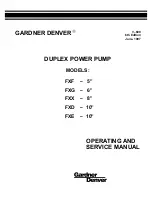
Manual 2100-601
Page
29 of 42
SERVICE HINTS
1. Caution user to maintain clean air filters at all
times. Also, not to needlessly close off supply
air registers. This may reduce airflow through
the system, which shortens equipment service
life as well as increasing operating costs and
noise levels.
2. Switching to heating cycle at 75°F or higher
outside temperature may cause a nuisance trip
of the remote reset high pressure switch. Turn
thermostat off, then on to reset the high pressure
switch.
3. The heat pump wall thermostats perform
multiple functions. Be sure that all function
switches are correctly set for the desired
operating mode before trying to diagnose any
reported service problems.
4. Check all power fuses or circuit breakers to be
sure they are the correct rating.
5. Periodic cleaning of the outdoor coil to permit
full and unrestricted airflow circulation is
essential.
6. Some service requires the need to remove the
unit from the wall including replacement of
the indoor coil and/or the outdoor coil. Also,
servicing the outdoor fan motor or fan blade
will require removing the unit from the wall if
the unit is installed at a height that is not easily
accessible from the outside of the building.
In order to remove the unit from the wall the
following procedure must be used:
a. Turn off power to the unit at the remote
location. Some units may have more than one
power supply.
b. Disconnect field wiring at unit terminal block
and remove from unit.
c. Disconnect condensate drain.
d. Remove the lower skirting around the unit.
e. Remove wall mounting brackets from wall on
each side of the unit and/or remove the
internal bolts in the lower section securing
unit to wall sleeve.
f. If unit is attached to duct work, remove upper
cabinet extension by removing the top center
screw only from the cabinet side panel.
g. Remove screws that attach the duct work to
the unit flanges.
This unit is equipped with four rollers
mounted to the base. For ease of pulling unit
out from the wall, you may want to remove
the bottom service door which requires
removal of the return air panel, and grip the
front flange of the base pan then pull straight
out.
7. Annual maintenance is required to make sure
that all of the systems are functioning properly.
a. Check to make sure that the drains are not
obstructed in any way.
b. Remove any debris in the condenser section
of the unit.
c. Inspect and clean mist eliminator as described
below.
d. Inspect and wash outdoor coil as necessary.
MIST ELIMINATOR SERVICE
A mist eliminator is supplied with the wall sleeve. The
mist eliminator is constructed of an aluminum frame
and mesh. The mist eliminator is located in the top
section of the wall sleeve and can be removed from the
inside of the building without removing the unit from
the wall. This requires that the ventilation package be
removed.
It is recommended that the mist eliminator be inspected
annually and serviced as required. The mist eliminator
can be inspected from the outside of the building by
looking through the outdoor grille. The mist eliminator
can be serviced from the outside by using a vacuum
cleaner. The outdoor grille must be removed. Use the
vacuum to remove dirt and debris from the surface of
the mist eliminator. If additional cleaning is required,
the mist eliminator will have to be removed from the
sleeve.
The ventilation package will have to be removed to
gain access to the mist eliminator. If the blank off plate
option is used, it is not necessary to service the mist
eliminator. The steps necessary to remove each of the
vent options are listed on the following pages.
The mist eliminator can be cleaned by washing with
soap and water. The excess water should be shaken off
the mist eliminator before it is reinstalled.













































